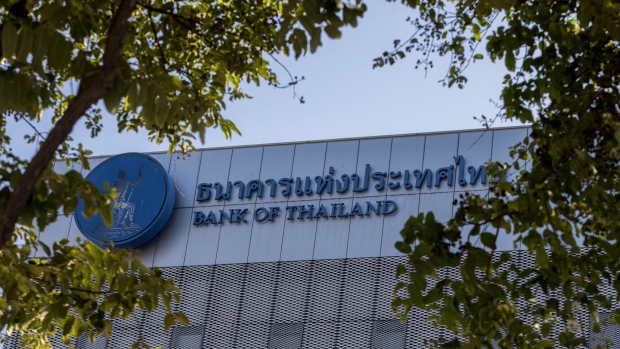Apr 10, 2024
Thai Central Bank Holds Rate, Deepening Rift With Government
, Bloomberg News

(Bloomberg) -- Thailand’s central bank left interest rates unchanged Wednesday, underlining the limits of monetary policy to support economic growth especially when fiscal settings are loose.
The Monetary Policy Committee voted 5-2 to maintain the one-day repurchase rate steady at a decade-high 2.50%, as predicted by 17 of the 24 economists surveyed by Bloomberg. In doing so, the rate panel refused to yield to the demands of Prime Minister Srettha Thavisin to cut borrowing costs to spur credit in Southeast Asia’s second-largest economy.
“The prevailing monetary policy framework seeks to maintain price stability, support sustainable growth, and preserve financial stability,” Assistant Governor Piti Disyatat said in a statement.
The baht held on to gains after the BOT decision, trading up 0.2% against the dollar at 2:03 p.m. local time, while local stocks gained.
The decision to extend the rate pause for a third straight time puts the BOT at crossroads with the government, which believes the economy needs cheaper borrowing costs to boost credit and consumption to end a decade of average below 2% growth. The central bank said the economy faces risks including from fiscal stimulus measures — a reference to Srettha’s controversial $14-billion cash handout program to jump-start the economy.
What Bloomberg Economics Says...
The Bank of Thailand scored stronger points for credibility Wednesday. Its rate hold came despite more intense pressure from the government to cut and a growing number of analysts expecting the central bank to capitulate. Even so, the BoT appears to be preparing the ground for a rate cut. That’s our read on its guidance that its future decisions will be data dependent.
— Tamara Mast Henderson, economist
For the full note, click here
The same day, the prime minister, who’s stressed the need for coordinated fiscal and monetary actions, headed a panel that approved funding for the program that will see 50 million adults Thais each be handed 10,000 baht ($275) of cash. The government will fund the program, aimed to be implemented later this year, by drawing money from the budget as well as through loans from a state lender.
While the program adds to concerns about widening budget deficit, which in turn poses a risk to the country’s credit rating, the growing differences between the central bank and the government are bound to make investors nervous.
Investors have pulled out more than $2.9 billion from Thai stocks and bonds this year, according to data compiled by Bloomberg.
Piti said the rate panel expressed concern about elevated Thai household debt, and the need to deleverage to help mitigate risks to the financial system. The MPC noted that the effectiveness of monetary policy in resolving financial access issues was limited, he said.
HSBC Holdings Plc economist Aris Dacanay said the BOT was slightly hawkish in its tone and may keep rates unchanged for the rest of the year.
“We think the upside risk of the digital cash vouchers will make it less likely for the BOT to loosen the monetary reins, not to mention the need to bring household debt down,” Dacanay said in a report. “History shows that easing monetary and fiscal policy at the same time can increase household debt quite substantially.”
Still, the BOT expects the Thai economy to expand by 2.6% this year and by 3% in the next, a pace faster than the previous year amid support from private consumption, tourism and public expenditure. While that expansion will be better than the current average sub-2% growth seen in the past decade, it’s far from the 5% growth Srettha is targeting during his term.
The central bank has argued that some of the problems holding back growth are structural and can’t be addressed by monetary policy, while dismissing months of negative inflation prints as a fallout of state subsidies.
The BOT expects headline inflation to average 0.6% this year and accelerate to 1.3% in 2025.
The rate-setters will monitor growth and inflation dynamics in setting monetary policy going forward, according to the statement.
--With assistance from Tomoko Sato, Cecilia Yap, Pathom Sangwongwanich, Patpicha Tanakasempipat, Nishant Dahiya and Claire Jiao.
(Updates with analyst comments from 10th paragraph.)
©2024 Bloomberg L.P.





